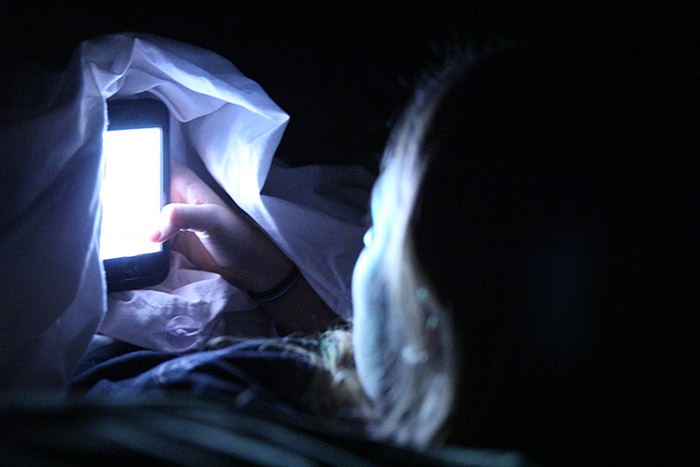Sound Asleep
Sleep is essential, so why aren’t teenagers getting enough of it?
April 11, 2016
It’s a daily conversation in high schools, West included.
“I’m so tired.”
“I didn’t sleep at all last night.”
“I’ll probably fall asleep in seventh hour.”
To put it simply, high school students aren’t sleeping enough.
According to Nationwide Children’s Hospital, most teenagers need exactly 9 1/4 hours of sleep, but on average only get about 7.5 hours.
There are countless reasons for teenagers not getting the proper amount of sleep, and while it might be appealing to attempt to find one true culprit, that would oversimplify the issue. Everything from biology to school to technology can be blamed, and fixing one of the factors wouldn’t necessarily solve the others. Because lack of sleep isn’t demonized the way that drug use or starving oneself is, it’s often dismissed as a lesser issue. But getting the proper amount of sleep is still an important aspect of living a healthy lifestyle, even if it’s often overlooked. According to a study by the National Institute of Health, a person who had stayed awake for 21 hours was as impaired as a person with a blood alcohol level of 0.08. But it can also turn into a long term issue.
Eventually, lack of sleep will start to affect a person’s overall health, something senior Shannon Moore has experienced personally.
“Every year I would get sick like clockwork. I would get sick every finals week and stay sick into the first week of break. I would wear myself down by not sleeping as much as I should, not eating or drink enough, and stressing,” Moore said.
Moore often prioritizes her schoolwork over sleep.
“I stay up really late to get all my work done or I go to bed and get up really early to get my work done,” Moore said.
Although this has affected her health, Moore believes her habits aren’t uncommon.
“I think my sleeping habits are unusual for a normal person, but for a high school or college student I think they’re normal,” Moore said.
Statistics do seem to support Moore’s theory.
70.2 percent of West students reported an average of six hours or fewer each night, falling even farther below the recommended amount than the national average. Additionally, 43.2 percent of students claimed that homework was the main reason they were staying up late.
Excessive homework is such a common complaint amongst high schoolers that it’s become a stereotype and even a punchline at times. But if the numbers are to be believed, the complaint may be valid.
Homework isn’t the sole culprit, though.
Biology is a major factor, and perhaps the most difficult part of the problem to solve. Not only do teenagers require more sleep than most ages, but they are programmed to follow a different schedule. Humans have an internal clock, or circadian rhythm, which is affected by various factors including season and age. When a person hits puberty, their internal clock shifts forward about two hours. If left to their own devices, a young child may fall asleep at 9:30 pm and wake up at 6:30 am. However, as a teenager they wouldn’t fall asleep until 11:30 pm and, consequently, would wake up at 8:30 am. After adolescence, the internal clock begins to fall behind again. By middle or late adulthood, that same person may be inclined to fall asleep at 8:30 pm and wake up at 5:30 am.
However, school schedules do not align with the average teenager’s internal clock. At West, school is in session at 7:40 am, and many students have to leave early due to before school activities, bus routes or a long commute. Conversely, elementary school starts at 8:10 and middle school at 8:45. This is not unusual. According to a study by the CDC, the average start time for secondary schools in Kansas is 8:00. Although early high school start times are common, they aren’t necessarily the best system.
Start times have to be staggered because of the aforementioned bus routes. However, it may make more sense to shift the start times around. Since elementary schoolers have the earliest internal clock, they could have the 7:40 start time, high school could begin at 8:45 and middle school at 8:10.
Still, there are variables outside of biology to consider. From a purely scientific standpoint, starting high school later seems like the obvious course of action. But there are also quite a few social factors to consider.
Although elementary schoolers will naturally wake up earlier than teenagers, younger children still depend on adults for personal care and transportation. This means school schedules have to accommodate parent schedules, which typically means planning around an 8-5 work day.
High schoolers also have after school activities to contend with. Under the current school schedule, a two hour after school activity could be over by 5:00. But if school started an hour later, that activity would go until 6:00, giving students less time for homework, socializing and of course sleep.
More recently, technology has come into play. All West students have laptops, and most have cell phones; additionally, 35.1 percent of students said they stayed up late because they were using their phone or laptop. The screens on these devices emit blue light, which prevents the brain from releasing melatonin. Melatonin is a natural sleep aid, and would normally be released a few hours before a person falls asleep. But when exposed to blue light, the brain is tricked into thinking it’s still daytime and doesn’t release the hormone.
According to the Washington Post, a simple way to counter this without giving up screen time is to change the visual settings on a device. Apps like f.lux allow users to adjust the visual temperature of their screens, so that blue light is emitted during the day while orange light is produced at night. The warmer light doesn’t suppress melatonin, making technology more sleep friendly.
While technology is a relatively new issue, many of these problems have occurred for generations. Only time will tell if teenagers are ever going to get to bed on time.



